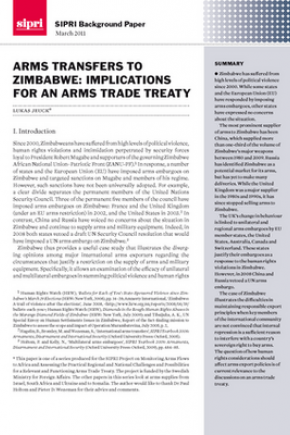Arms Transfers to Zimbabwe: Implications for an Arms Trade Treaty
This SIPRI Background Paper details the sources of Zimbabwe's arms and military equipment and examines the dissenting views on international interference in intrastate conflicts and the question of how human rights considerations should affect arms supplies. It considers some of the implications for an arms trade treaty arising from the case of Zimbabwe and international agreement on what should constitute ‘responsible arms transfers’.
Related publications
This paper is one of a series produced for the SIPRI Project on Monitoring Arms Flows to Africa and Assessing the Practical Regional and National Challenges and Possibilities for a Relevant and Functioning Arms Trade Treaty. The project is funded by the Swedish Ministry for Foreign Affairs. The other background papers in the series are:
Holtom, P., 'Ukrainian Arms Supplies to Sub-Saharan Africa', SIPRI Background Paper, Feb. 2011.
Wezeman, P. D., 'Arms Flows and the Conflict in Somalia', SIPRI Background Paper, Oct. 2010.
Wezeman, P. D., 'South African Arms Supplies to Sub-Saharan Africa', SIPRI Background Paper, Jan. 2011.
Wezeman, S. T., 'Israeli Arms Supplies to Sub-Saharan Africa', SIPRI Background Paper, Oct. 2011.
The final report of the project is
Wezeman, P. D., Wezeman, S. T. and Béraud-Sudreau, L., Arms Flows to Sub-Saharan Africa, SIPRI Policy Paper no. 30 (SIPRI: Stockholm, Dec. 2011).

